|
|
|
Sort Order |
|
|
|
Items / Page
|
|
|
|
|
|
|
| Srl | Item |
| 1 |
ID:
107958
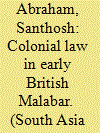

|
|
|
|
|
| Publication |
2011.
|
| Summary/Abstract |
This article examines the development of colonial law in Malabar between 1792 and 1810. Within the historical context of emerging colonialism as a pivotal factor, it shows that there was no simple unilinear process in the making of colonial law in this region of India, but rather a series of continuities and discontinuities of practices. A clear shift in the logic of governance is identified, however, as new technologies of power, particularly writing and documentation, resulted in several formalities of practices in the making of the colonial state and legal system in India.
|
|
|
|
|
|
|
|
|
|
|
|
|
|
|
|
| 2 |
ID:
190173
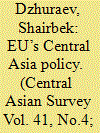

|
|
|
|
|
| Summary/Abstract |
One of the distinguishing characteristics of the European Union’s (EU) policy in Central Asia has been its continuity. Although the EU has recently revised its strategy for the region, Brussels’ priorities saw little change both thematically and in terms of approach. This article argues that two mutually reinforcing factors help explain the continuity of the EU’s Central Asia policy. First, the sui generis nature of the EU means the decision-making system is both complex and decentralized. The multitude of veto actors serves to make the status quo more realistic. Furthermore, the EU leadership is immune from the incentives and pressures of domestic political competition, an essential factor in the foreign policymaking of national leaders. The compounding factor is Central Asia’s peripherality for Brussels. The region is distant geographically and marginal economically. As a result, continuing existing approaches and commitments remains the least costly and most feasible policy option.
|
|
|
|
|
|
|
|
|
|
|
|
|
|
|
|
| 3 |
ID:
107547
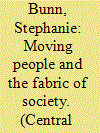

|
|
|
|
|
| Publication |
2011.
|
| Summary/Abstract |
This article explores the relationship between continuity and change in Central Asian domestic felt textile production. In order to set this in the context of a pastoralist perspective, the paper draws on regional practices such as oral poetry and movement through landscape, as well as human-environment relations in order to reveal the dynamic and creative improvisatory process through which local textile production can be understood. In so doing, it examines whether Euro-American anthropology's rejection of a 'static' notion of 'tradition' for one of hybridity (reflecting a critique of its own nostalgia), has inadvertently moved us away from a focus on the historical narratives of those we study, which is often at odds with their own concerns. The author argues that for 'moving people', it is the dynamics of orality, human-environment relations and the practice (rather than the evidence) of material culture that elucidates our understanding of the relationship between continuity and change. The power of felt is thus reflected in the apparently ephemeral, non-enduring, aspects of these practices, which are what makes them endure, continuously bringing the past into being for new cultural futures.
|
|
|
|
|
|
|
|
|
|
|
|
|
|
|
|
| 4 |
ID:
101774
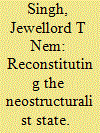

|
|
|
|
|
| Publication |
2010.
|
| Summary/Abstract |
The Chilean governance model of resource extraction challenges the view that post-neoliberalism is an opposing development model rejecting the Washington Consensus, which is constitutive of neoliberal governance. Instead, post-neoliberalism is continuity with change, where marketised governance in mining is maintained by the Chilean state yet certain policy agendas are introduced in response to the failures of staunchly private sector-driven development. Neostructuralism follows the logic of productivism, which emphasise the depoliticisation of copper management and the political exclusion of voices critical of the model. However, it breaks away from the typical mode of neoliberalism because there exist political spaces for contestation of copper policy, particularly through the re-regulation of labour practices and the passage of royalty law to address Chile's vulnerabilities to external factors affecting copper production. The article contributes to the understanding of continuities and changes in post-neoliberal Latin America by unpacking the elements of natural resource governance in one of the most widely cited successful cases of a mining-based development model in the developing world.
|
|
|
|
|
|
|
|
|
|
|
|
|
|
|
|
| 5 |
ID:
157166
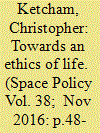

|
|
|
|
|
| Summary/Abstract |
In the broad context of intergenerational justice, this paper is an effort towards developing a theory of an ethics of life. My thesis is that that continuity of life is the foundation for an ethics of life. The fundamental question associated with the ethics of life is, ‘What is best for life.’ Following brief discussions about life and the long-term continuity challenges life will face as the sun begins to die, three legs of a triad for an ethics of life will be proposed and explicated.
|
|
|
|
|
|
|
|
|
|
|
|
|
|
|
|
| 6 |
ID:
167189
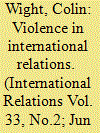

|
|
|
|
|
| Summary/Abstract |
This article examines change and continuity in the function, role and moral judgement of violence in international relations. In terms of change, the conclusions are mostly pessimistic if the aim is the complete eradication of political violence. The control of violence, on the other hand, and the ability to hold those who employ it to increasing moral and legal standards is perhaps one of the most significant changes in international relations from 1919 to 2019. However, this does not mean that violence has been replaced or even transformed. Violence is constitutive of the political. It is the first and the last word in politics. This is the continuity of violence. Violence, of which war is only the most visceral expression, has not been transformed or replaced, but rather it has been displaced into legal systems, institutional orders and new forms of conflict. Inter-state war may be in decline, but intra-state conflict is rising. To develop this argument, the article argues that change can only be understood as change against a horizon of continuity.
|
|
|
|
|
|
|
|
|
|
|
|
|
|
|
|
| 7 |
ID:
098721
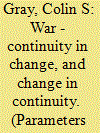

|
|
|
|
|
|
|
|